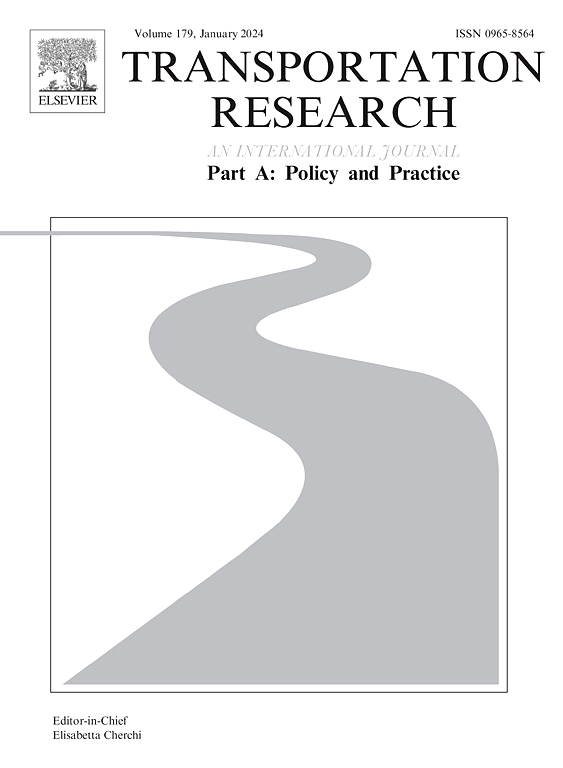新兴可持续发展领导者对未来交通的看法:台湾高等教育课程中的 Q 研究
IF 6.3
1区 工程技术
Q1 ECONOMICS
Transportation Research Part A-Policy and Practice
Pub Date : 2024-10-18
DOI:10.1016/j.tra.2024.104290
引用次数: 0
摘要
随着 2050 年等重要里程碑的临近(届时全球社会的目标是实现零碳排放),我们今天所做的有关交通基础设施的决策将越来越具有影响力。本研究试图将对话扩大到当前政策制定者和交通规划者的传统领域之外,纳入将继承当今决策并承受其长期影响的一代人的观点。本研究调查了台湾一个独特的以可持续发展为重点的本科课程的学习者,他们对受人为气候变化影响的世界中交通的未来的看法。考虑到他们作为未来可持续发展专业人士和领导者的潜力,了解他们的观点可为教育和交通政策提供启示。本研究采用 Q 方法捕捉了一系列观点。五种不同的观点包括集体责任倡导者和技术乐观主义者,他们分别对集体行动和技术进步持积极态度。务实的独行者和私人交通倡导者以个人舒适度为先,对环保目标持怀疑态度。而公共交通倡导者则倾向于共享交通形式,并认为政府在碳减排工作中扮演着重要角色。这项研究的意义在于,它在台湾独特的背景下,强调了以前未被充分探索的人群,通过使用 Q 方法揭示了他们对气候变化塑造的交通未来的看法,以及研究结果对政策的影响。本文章由计算机程序翻译,如有差异,请以英文原文为准。
Views of emerging sustainability leaders on the future of Transport: A Q study in a Taiwan tertiary education program
As we approach critical milestones such as the year 2050, by which time the global community aims to achieve zero carbon emissions, the decisions we make today concerning transportation infrastructure become increasingly influential. This research seeks to broaden the dialogue beyond the traditional domain of current policymakers and transport planners by incorporating the perspectives of the generation that will inherit and live with the long-term impacts of today’s decisions. This study investigates the perspectives of learners in a unique sustainability-focused undergraduate program in Taiwan regarding transportation’s future in a world impacted by anthropogenic climate change. Considering their potential as future sustainability professionals and leaders, understanding their views can offer insights for both educational and transportation policy. Using Q methodology, this research captures a range of viewpoints. The five distinct perspectives include the advocates of collective responsibility and tech-optimists, who hold positive views towards collective action and technological advancements respectively. The pragmatic solitaries and private transport advocates, who prioritize personal comfort and express skepticism about environmental targets. The public transport advocates, meanwhile, favor shared forms of transport and see a crucial role for the government in carbon reduction efforts. The study’s significance lies in its emphasis on a previously underexplored demographic within the unique context of Taiwan, revealing their perspectives on a transportation future shaped by climate change by using Q methodology, and its implications for policy derived from the findings.
求助全文
通过发布文献求助,成功后即可免费获取论文全文。
去求助
来源期刊
CiteScore
13.20
自引率
7.80%
发文量
257
审稿时长
9.8 months
期刊介绍:
Transportation Research: Part A contains papers of general interest in all passenger and freight transportation modes: policy analysis, formulation and evaluation; planning; interaction with the political, socioeconomic and physical environment; design, management and evaluation of transportation systems. Topics are approached from any discipline or perspective: economics, engineering, sociology, psychology, etc. Case studies, survey and expository papers are included, as are articles which contribute to unification of the field, or to an understanding of the comparative aspects of different systems. Papers which assess the scope for technological innovation within a social or political framework are also published. The journal is international, and places equal emphasis on the problems of industrialized and non-industrialized regions.
Part A''s aims and scope are complementary to Transportation Research Part B: Methodological, Part C: Emerging Technologies and Part D: Transport and Environment. Part E: Logistics and Transportation Review. Part F: Traffic Psychology and Behaviour. The complete set forms the most cohesive and comprehensive reference of current research in transportation science.

 求助内容:
求助内容: 应助结果提醒方式:
应助结果提醒方式:


